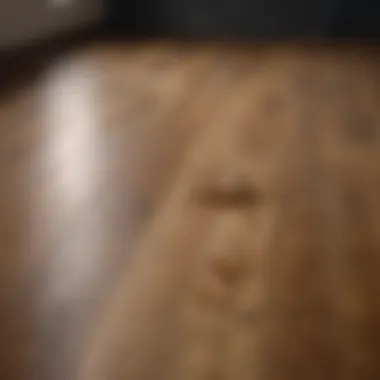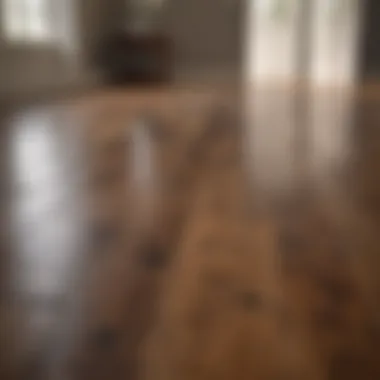Using Vinegar on Wood Floors: A Comprehensive Review


Intro
Maintaining the visual appeal and integrity of wood floors remains a priority for numerous homeowners. With the rising trend of eco-friendly cleaning solutions, vinegar often emerges as a popular option. But is it truly effective? This article aims to analyze the implications of employing vinegar on wood flooring. By delving into the chemical properties of vinegar, assessing its effectiveness, discussing potential drawbacks, and considering alternative cleaning methods, the goal is to furnish homeowners with comprehensive guidance in floor maintenance.
Featured Homes and Locations
Showcase of Unique Homes
In various unique homes across the globe, wood flooring showcases the charm and warmth of natural materials. However, cleaning practices can differ significantly. When considering vinegar as a cleaning solution, the need for caution becomes apparent. Many homeowners place emphasis on preserving the aesthetics of their wooden floors, recognizing that the wrong cleaning method can lead to unwanted damage.
Iconic Locations Around the World
Around the world, renowned locations often exhibit stunning wooden interiors. From the rustic cabins in the Swiss Alps to the modern architecture of Scandinavian homes, these spaces highlight the importance of proper care. The use of vinegar in such esteemed settings raises questions regarding practicality and safety. While vinegar may seem appealing due to its low cost and natural properties, understanding its effects on various wood finishes is crucial for any property owner concerned with aesthetics.
Effectiveness of Vinegar as a Cleaning Solution
Vinegar, primarily acetic acid diluted with water, can cut through grime and provide a degree of shine. It might serve as a promising candidate for maintaining the cleanliness of wood floors. However, the effectiveness can vary based on the finish of the wood.
- Unfinished Wood: Using vinegar on unfinished wood can be detrimental, as it may cause absorption and stains.
- Polyurethane Finishes: This varnish can resist vinegar’s acidity, making it relatively safe as long as it is diluted appropriately.
- Oil Finishes: While vinegar can clean these finishes, it can also strip away essential oils, thus dulling the sheen over time.
Potential Drawbacks of Using Vinegar
- Acidic Nature: The acidity of vinegar can harm the finish of hardwood floors. A powerful acidic reaction can lead to dullness and even irreversible damage.
- Residue Issues: Improper mopping may leave behind a sticky residue that attracts dust and dirt, causing floors to appear unclean.
- Inconsistent Results: The effectiveness varies between different wood species and finishes, leading to unpredictable outcomes.
"While vinegar is a popular cleaning agent, it is essential to evaluate its fit for your specific flooring type to avoid damaging your investment."
Alternative Cleaning Methods
Homeowners may want to consider alternatives to vinegar for cleaning their wood floors:
- Soap and Water: A mixture of mild soap and warm water often suffice for regular cleaning.
- Specialized Hardwood Floor Cleaners: Brands like Bona offer formulations designed specifically for wood floors, ensuring safety and effectiveness.
- Microfiber Mops: These can effectively trap dust and debris without the use of chemicals, preserving the finish of the wood.
Finale
Understanding the implications of using vinegar on wood floors is essential for homeowners. While vinegar might offer certain advantages, the risks often outweigh the benefits, especially when it comes to maintaining aesthetics and integrity. It is crucial to explore safer alternatives, ensuring the long-lasting beauty of wooden flooring within homes.
For more information on cleaning techniques and specific wood care guidelines, you can refer to resources such as Wikipedia and Britannica.
Homeowners aiming for a clean and well-maintained wood floor should always prioritize methods that ensure the preservation of these cherished surfaces.
Prolusion to Wood Floor Maintenance
Maintaining wood floors is a significant aspect of home care that deserves attention. These surfaces not only add to the aesthetic value of a home but also contribute to its overall structural integrity. Proper cleaning and maintenance can prolong the life of these floors and prevent costly repairs or replacements.
Importance of Proper Cleaning
Proper cleaning ensures that wood floors remain in optimal condition. Regular maintenance prevents dirt and grime from accumulating, which can scratch and damage the finish. It preserves the wood's natural beauty and sheen. Additionally, cleaning with suitable products helps maintain indoor air quality by reducing allergens and dust.


By taking care of wood floors, homeowners can enjoy several benefits:
- Enhanced lifespan: Consistent care prolongs the life of wood floors, saving money in the long run.
- Improved appearance: Clean floors look better, making the home more inviting.
- Better health: Reducing dust and allergens improves overall indoor air quality, which is essential for family health.
Ignoring wood floor maintenance can result in serious issues over time. Scratches, dull finishes, and discoloration can be costly problems that require professional refinishing to resolve. Therefore, it’s imperative to emphasize proper cleaning routines from the start.
Common Cleaning Agents
When it comes to cleaning wood floors, the right agents are crucial. Homeowners often reach for familiar, household products. Common cleaning agents can be grouped into two categories: commercial cleaners and natural solutions.
- Commercial cleaners: There are many products specifically formulated for wood flooring. Brands like Bona and Murphy Oil Soap are popular choices among homeowners for their effectiveness and ease of use. These cleaners often provide a balance of cleaning power and safety for the wood finish.
- Natural solutions: Some prefer a more DIY approach. Solutions like vinegar and water or soapy water can be effective as well. Vinegar, a common household item, is frequently discussed in cleaning circles. However, its effectiveness and safety on wood floors can be contentious. Understanding both the advantages and potential risks is essential for making informed choices.
Ultimately, selecting the correct cleaning agent depends on the type of wood floors, the finish applied, and individual cleaning preferences.
Vinegar as a Cleaning Agent
Vinegar is often celebrated for its versatility in household cleaning. It is a common ingredient in many kitchens and cleaning solutions primarily due to its natural properties. Understanding its role as a cleaning agent, especially for wood floors, is essential. Many homeowners seek out cheap, eco-friendly alternatives to commercial cleaning products. Vinegar stands out in this category, offering both simplicity and effectiveness. However, this convenience comes with important considerations regarding its use on wood finishes.
Chemical Composition
Vinegar is an acetic acid solution, typically composed of about 5% acetic acid and 95% water. This unique composition allows it to effectively break down mineral deposits, dirt, and grime. The acidic nature of vinegar can assist in cutting through tough stains, making it an appealing option for many cleaning tasks.
It is worth noting that there are various types of vinegar, including white vinegar, apple cider vinegar, and balsamic vinegar. Among these, white vinegar is most commonly used for cleaning purposes because of its higher acidity and lower cost. Homeowners should recognize that while vinegar is effective in many cleaning scenarios, its acid may pose a risk to certain wood finishes.
How Vinegar Works on Dirt and Grime
The mechanism of vinegar as a cleaning agent is quite straightforward. When applied to surfaces, the acetic acid interaction helps to loosen and dissolve dirt, oils, and stains. For wood floors, this can mean a smoother cleaning process. The dirt may lift away more easily, allowing for a more thorough clean with less scrubbing.
However, the effectiveness of vinegar can vary based on surface type and the nature of the grime. For instance:
- Grease stains: Vinegar can combat greasy residues, breaking them down quickly.
- Water spots: Its acidic nature can help remove hard water stains effectively.
- Dirt layers: Regular use may prevent the accumulation of dirt over time, leading to easier maintenance.
Some cleaner options, however, may not agree well with vinegar. Certain finishes, such as wax or oil-based, may react negatively when exposed to vinegar, leading to dullness or a compromised surface.
"While vinegar can be an effective cleaner, caution should be exercised with its use on wood floors to avoid potential damage to the finish."
Safety Concerns of Using Vinegar on Wood Floors
When discussing the maintenance of wood floors, it is crucial to consider safety concerns, particularly regarding the use of vinegar as a cleaning agent. While vinegar is often touted as an effective and natural solution, its acidic nature may pose risks to both the wood surface and its finish. Understanding these risks is essential for homeowners who seek to preserve the aesthetic and structural integrity of their flooring.
Potential for Damage to Wood Finish
Using vinegar on wood floors can lead to potential damage, particularly to the finish. Most wood floors are treated with a protective layer that enhances their appearance and increases durability. Vinegar's acidity can erode this finish over time, resulting in a dull appearance and susceptibility to scratches.
Here are some key points to consider:
- Acidic Reactions: The acetic acid in vinegar can react negatively with finishes such as polyurethane. This may lead to a cloudy or foggy appearance.
- Frequent Use: Regularly using vinegar can accelerate the breakdown of the finish, necessitating more frequent refinishing.
- Surface Scratches: Once the finish is compromised, the wood itself remains exposed to wear and potential scratching from dirt and debris.
"Over time, using vinegar can severely limit the lifespan of your wood flooring if not carefully managed."


Risks Associated with Acidic Solutions
The application of acidic solutions like vinegar carries various risks that homeowners must recognize. These risks extend beyond simply damaging the finish. They also involve the condition of the wood itself.
Here are several considerations:
- Absorption of Moisture: Wood is a porous material. When vinegar seeps into the wood grain, it can lead to changes in moisture content. This can foster conditions conducive to warping.
- Staining: If vinegar remains on the surface too long, it can create stains that are difficult to remove. These stains originate from the chemical reaction between the acid and the wood's tannins.
- Inefficiency in Cleaning: While vinegar may dissolve dirt and grime, it may also leave residues that attract more dirt, negating its initial cleaning efforts.
Types of Wood Floors and Their Responses to Vinegar
Understanding the diverse types of wood floors is essential for home maintenance. Each type of flooring has unique properties that influence how they react to cleaning agents, particularly vinegar. This section delves into solid wood floors, engineered wood floors, and laminate flooring, offering insights into their particular responses when exposed to vinegar. Knowing these differences helps homeowners make informed decisions about maintaining their wooden surfaces without compromising their integrity.
Solid Wood Floors
Solid wood floors are created from a single piece of timber. This type of flooring is often cherished for its longevity and ability to be refinished multiple times. However, when it comes to using vinegar, caution is advisable. The high acidity of vinegar can harm the finish on solid wood floors, leading to dullness or damage over time.
While some maintenance routines might incorporate mild vinegar solutions, it is best to use them sparingly. Instead of regular cleaning with vinegar, homeowners can opt for a gentle pH-balanced cleaner.
- Pros: Durable, can be refinished, aesthetic appeal
- Cons: Susceptible to acidic cleaners like vinegar, may require professional refinishing
Engineered Wood Floors
Engineered wood floors consist of several layers of plywood with a thin veneer of solid wood on top. This design provides some resistance to moisture but can still be impacted negatively by acidic solutions, including vinegar. Regular exposure can warp the layers, causing irreversible damage.
For maintenance, it is best to use gentle cleaning methods that do not rely on vinegar. A damp mop with distilled water or mild soap can effectively remove dust and dirt without risking the integrity of the engineered layers.
- Pros: More resistant to humidity, often more affordable, easy to install
- Cons: Less durable than solid wood, vulnerable to moisture damage
Laminate Flooring
Laminate flooring is a synthetic material designed to mimic the look of wood. It is highly resistant to scratches and stains, making it a popular choice among homeowners. However, laminate flooring is typically sealed with a protective layer that can be damaged by vinegar. Acidic cleaners can lead to peeling or discoloration of the surface.
Homeowners should avoid using vinegar on laminate flooring altogether. Instead, a simple cleaning solution made from water and a few drops of dish soap works effectively for keeping these floors in good condition.
- Pros: Affordable, easy to maintain, versatile designs
- Cons: Cannot be refinished, vulnerable to water damage if seams are not properly sealed
Important Note: Each type of wood floor responds differently to cleaning methods. Understanding these distinctions is key to maintaining their beauty and durability.
Alternatives to Vinegar for Cleaning Wood Floors
Cleaning wood floors effectively requires a thoughtful approach. While vinegar is a common choice, its acidic nature can sometimes cause unintended harm. Choosing the right cleaning method is crucial for maintaining both the appearance and longevity of these surfaces. Several alternatives offer effective solutions for cleaning while ensuring the integrity of your wood floors.
Commercial Wood Floor Cleaners
Commercial wood floor cleaners are specifically formulated to address the unique needs of various types of wood floors. These products often contain pH-balanced solutions that effectively remove dirt and grime without damaging the finish. When selecting a commercial cleaner, consider the following:
- Type of Finish: Ensure that the cleaner is compatible with your floor’s finish—whether it’s polyurethane, shellac, or oil-based.
- Ingredients: Look for cleaners that avoid harsh chemicals. Natural ingredients are often safer for wood surfaces and the environment.
- Ease of Use: Many commercial cleaners come in spray bottles or ready-to-use formats, making the cleaning process more convenient.
Some reputable brands include Bona, Murphy Oil Soap, and Zep, which offer targeted solutions for different wood types and finishes.


"Opting for a specialized cleaner often yields better results than using vinegar."
Homemade Cleaning Solutions
For those who prefer a more hands-on approach, homemade cleaning solutions can be an effective and economical alternative to vinegar. Here are some options:
- Water and Mild Soap: Mixing a few drops of dish soap with warm water creates a gentle cleaning solution. This is especially effective for regular maintenance.
- Olive Oil and Vinegar Mix: Although it contains vinegar, combining it with olive oil creates a different product that can help condition the wood while cleaning. Use a ratio of one part vinegar to three parts olive oil for this mixture.
- Baking Soda: For tough stains, baking soda can be an effective abrasive. Mix it with water to form a paste. Apply it gently with a soft cloth and rinse thoroughly to avoid residue.
These homemade solutions allow for flexibility and customization based on the specific needs of your flooring. Each option presents a unique advantage—be it cost-effectiveness, easy accessibility, or control over ingredients—to ensure that your wood floors remain in good condition without the risks associated with vinegar.
Best Practices for Maintaining Wood Floors
Maintaining wood floors is an essential aspect of home care that ensures durability and aesthetic appeal. Proper maintenance practices can significantly extend the life of hardwood flooring. Effective maintenance methods not only preserve the finish but also enhance the overall beauty of the wood. This section outlines best practices, focusing on regular cleaning schedules and protective measures that homeowners can adopt.
Regular Cleaning Schedules
Establishing a regular cleaning schedule is vital for keeping wood floors looking their best. Dirt, dust, and debris accumulate over time and can damage the finish if left unattended. Here are some key points to consider:
- Frequency of Cleaning: Aim to sweep or vacuum wood floors at least once a week. This simple step can prevent scratches and preserve the shine of the wood.
- Seasonal Deep Cleaning: Every few months, consider deeper cleaning methods. This can include using a damp mop with a suitable cleaner specifically designed for wood floors.
- Immediate Cleaning of Spills: Accidents happen. It is crucial to clean up spills immediately to prevent potential damage from moisture or stains. Use a soft cloth for this task.
This routine not only helps maintain hygiene but also contributes to the longevity of the flooring.
Protective Measures
Protection is as important as cleaning. Implementing protective measures can shield wood floors from damage and deterioration. Below are some important practices:
- Use of Furniture Pads: Attach felt pads to the legs of furniture to prevent scratches when moving items around. This small adjustment can prevent significant wear on your wood floors.
- Area Rugs: Place area rugs in high-traffic zones. This can help absorb impact and reduce the wear caused by foot traffic.
- Avoiding Harsh Cleaning Solutions: Steer clear of products that contain harsh chemicals. These can strip the wood's finish and cause long-term damage to the surface.
"Protecting your flooring is as important as cleaning it. Preventive measures can save costly repairs in the future."
By adopting these practices, homeowners can enhance the resilience and beauty of their wood floors. Regular attention and care are key factors in successful wood floor maintenance.
Ending
The conclusion is a key component of this article, acting as a synthesis of information discussing vinegar as a cleaning agent for wood floors. It provides an opportunity to weigh the advantages and disadvantages of using vinegar specifically for this purpose. By thoroughly understanding these considerations, homeowners can make informed choices regarding their cleaning methods, ensuring the longevity of their flooring.
Weighing the Pros and Cons of Vinegar
When it comes to using vinegar on wood floors, it is crucial to assess both the pros and cons. Pros include:
- Natural Cleaning Agent: Vinegar is a non-toxic and eco-friendly option for cleaning households, making it appealing for those who prefer sustainable cleaning solutions.
- Cost-Effective: Vinegar is inexpensive and readily available, making it accessible for homeowners.
- Deodorizing Quality: Vinegar helps neutralize odors, contributing to a fresher environment.
However, there are notable cons as well:
- Acidic Nature: Vinegar’s acidity can damage wood finishes over time, leading to dullness or degradation of the surface.
- Potential for Water Damage: Over-saturation during cleaning can harm wooden flooring, especially when water seeps into seams.
- Not Suitable for All Wood Types: Some wood floors, particularly those with sensitive finishes, may react negatively to vinegar.
In evaluating these factors, one can conclude that while vinegar has several advantages, the potential risks may outweigh the benefits for certain wood floor types.
Final Recommendations for Homeowners
Based on the analysis throughout the article, here are some practical recommendations for homeowners when it comes to cleaning wood floors:
- Test First: Always conduct a small patch test in an inconspicuous area before using vinegar widely to ensure there is no damage.
- Dilute the Solution: If using vinegar, dilute it with water to reduce its acidity and lessen the risk of damage.
- Use Alternatives for Sensitive Finishes: For wood floors with sensitive finishes, consider using products specifically designed for wood cleaning, such as Bona Hardwood Floor Cleaner.
- Follow Up with Water: After cleaning with vinegar or any solution, quickly wipe down the floor with a dry cloth to avoid excess moisture accumulation.
Overall, it is crucial to prioritize the health and appearance of wood floors. Choosing the right cleaning method will not only maintain the aesthetic appeal of the flooring but also prolong its life.







